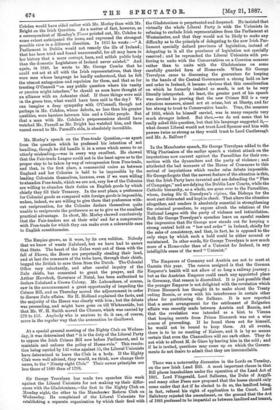Sir George Trevelyan has made two speeches this week against
the Liberal Unionists for not making up their differ- ences with the Gladstonians,—the first to the Eighty Club on Monday night, the other to the Manchester Reform Club on Wednesday. He complained of the Liberal Unionists for establishing a separate organisation by which their feud with
the Gladstonians is perpetuated and deepened. He insisted that virtually the whole Liberal Party is with the Unionists in refusing to exclude Irish representatives from the Parliament at Westminster, and that they would not be likely to make any difficulty as to the principle of delegating to the new Irish Par- liament specially defined provinces of legislation, instead of delegating to it all the provinces of legislation not specially reserved ; and he reproached the Liberal Unionists with pre- ferring to unite with the Conservatives on a Coercion measure rather than to unite with the Gladetonians on some carefully guarded form of Home-rale. When Sir George Trevelyan came to discussing the guarantees for keeping in the hands of the Central Government a strong hold on law and order in Ireland, it became obvious that this consideration on which he formerly insisted eo much, is not to be very literally interpreted. At least, the greater part of his speech was devoted to proving that the new Crimes Bill is a very atrocious measure, aimed not at crime, but at liberty, and far too strong to trust to Conservative hands. True, the measure of 1882, which he himself carried, was in many respects very much stronger indeed. But then,—we do not mean that he really asked this question, but that his language suggested it,— what decent Liberal would not trust Lord Spencer and him with powers twice as strong as they would trust to Lord Castlereagh and Mr. A. Balfour P


















































 Previous page
Previous page